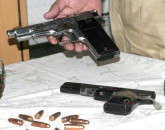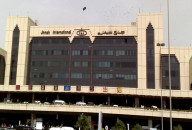Preventive measures: Govt, people need to do more to battle swine flu
Symptoms similar to common flu, govt hospitals must be better equipped.

The dengue virus near-epidemic has barely ended and the swine flu scare has flared up. Around 13 cases of swine flu have been reported in the province so far, with fears of more coming up.
Healthcare experts are worried that if the government does not take urgent steps to fight the virus, things could get much worse. Cases are reported across the world and in Pakistan every year but the government has yet to take preventive measures and provide adequate treatment facilities, said ENT surgeon and former general-secretary of the Pakistan Medical Association (PMA), Dr Qaiser Sajjad.
Because government hospitals do not have the proper facilities to treat swine flu, patients have no choice but to go to expensive private hospitals. The symptoms of swine flu might be similar to the symptoms of the ordinary flu, but the former is a complicated viral disease, he cautioned.
Till the first virology laboratory is set up, hospitals have to continue to send samples of swine flu and other viral diseases to the National Institute of Health in Islamabad, which is a “time-consuming” process, says Dr Sajjad. The government has, however, promised to set up the first test laboratory at Civil Hospital, Karachi. The laboratory will be inaugurated on January 2.
The doctor also suggests that the government should install thermal scanners at airports in order to detect travelers who are suffering from viral diseases.
“People with symptoms of swine flu should avoid meeting other people and keep their utensils, bedding and towels separate,” advised Dr Sajjad.
He also cautions against self-medication and ‘quacks’. Only professional doctors can distinguish between the common flu and the swine flu, he said.
“Swine flu spreads from one person to the other very easily,” warned Dr Farhan Essa, assistant professor of microbiology at the Dow Medical University of Health Sciences. That is why the affected people should get medical assistance immediately and take precautionary measures, he added.
“They should stay home and avoid visiting crowded public places,” he recommended. The initial symptoms of swine flu include having a runny nose, diarrhoea and vomiting, chest pains and shortness of breath or cough. If the H1N1 virus is found in children, then the symptoms also include irritation and loss of appetite. In many countries, vaccination for the swine flu is given to children up to five years old, elderly people and pregnant woman.
In-charge of the swine flu cell in Sindh, Dr Suresh Kumar, said that government hospitals across Sindh have been directed to take swine flu precautions.
Health EDO, Karachi, Nasir Javaid, said that six rooms have been allocated for swine flu patients in the CDGK-run Abbasi Shaheed Hospital. According to him, no case of swine flu has been reported in any government-run hospital so far.
However, he assured that the hospital has tablets for treatment of any patients that might come in.
Sindh Health Minister Dr Sagheer Ahmed said that the government is compiling a record of patients on the pattern of the dengue surveillance cell. “We will also remain in contact with private hospitals to get data from them so that the relatives of the affected persons can also be given treatment,” he said.
Published in The Express Tribune, December 27th, 2010.



















COMMENTS
Comments are moderated and generally will be posted if they are on-topic and not abusive.
For more information, please see our Comments FAQ